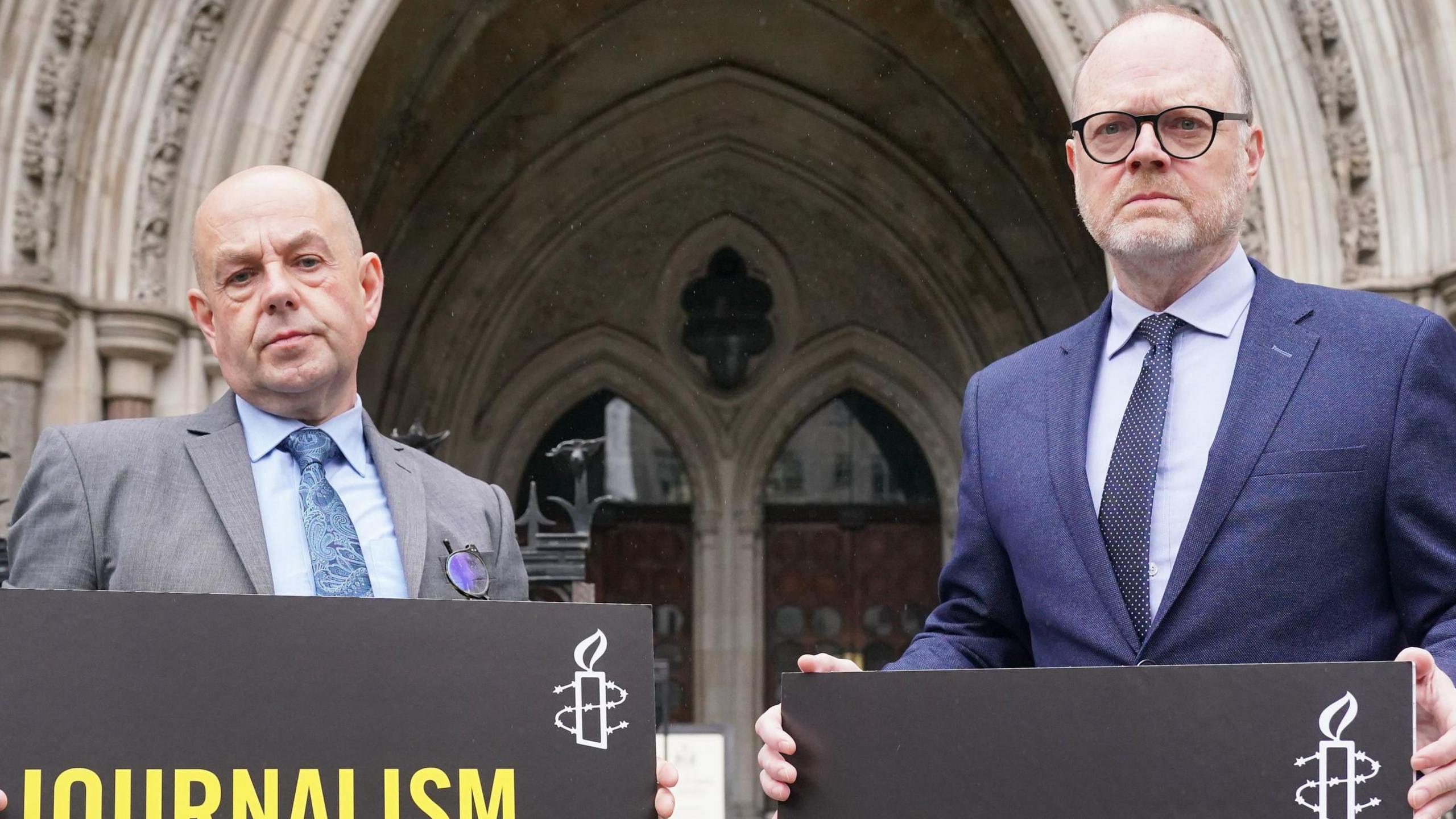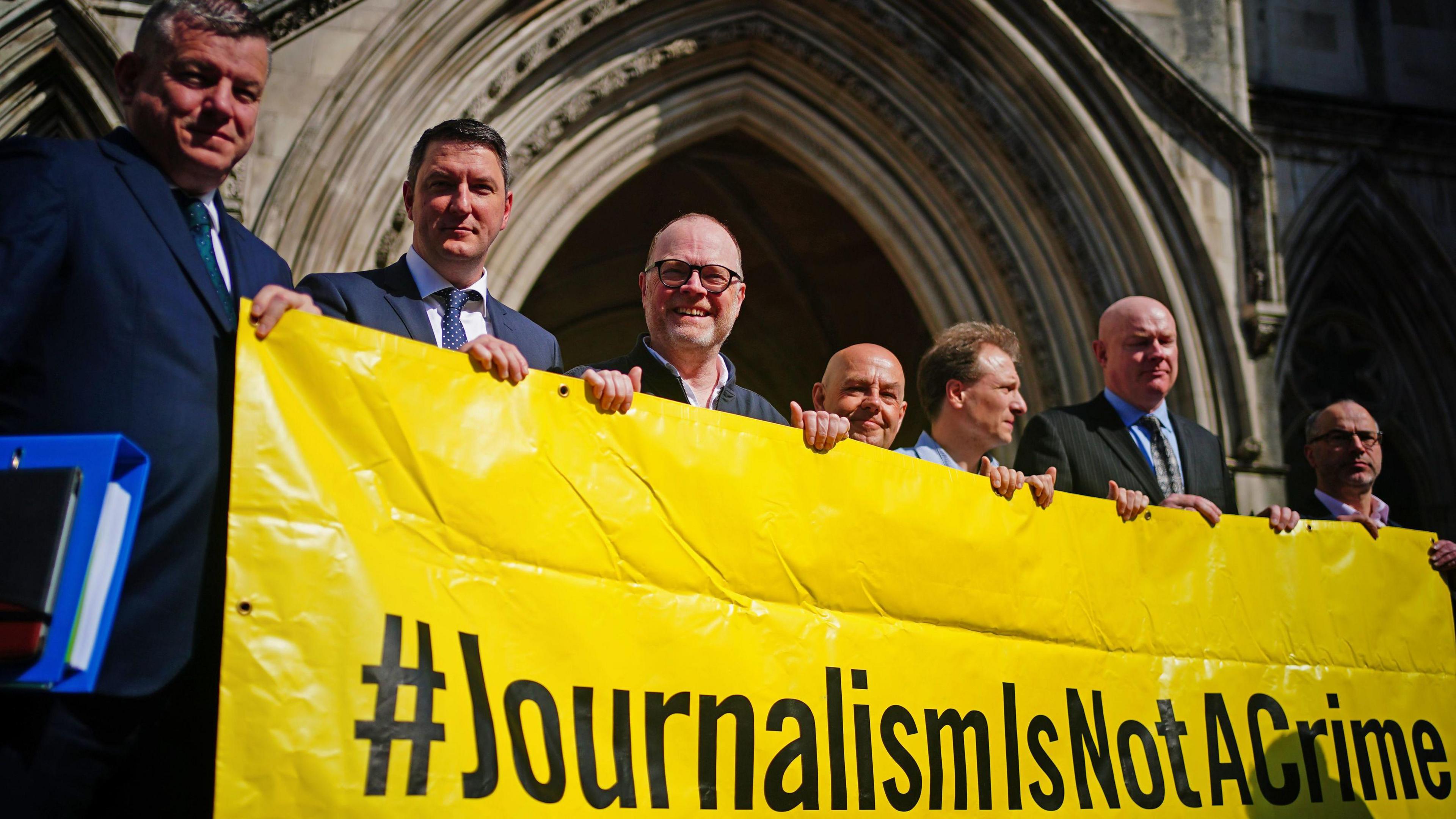Catholics blamed for anti-PSNI court rulings, court hears

Journalists Barry McCaffrey (left) and Trevor Birney outside the Royal Courts of Justice, in London
- Published
A senior police officer believed there were “perverse” judicial decisions against the Police Service of Northern Ireland (PSNI) because of the “prevalence of Catholics” in the court system, it has been claimed.
The allegation is contained in newly disclosed documents before the Investigatory Powers Tribunal (IPT) - a landmark hearing to determine whether secret monitoring of journalists to identify their sources was unlawful.
A lawyer said to suggest that senior judges had violated their judicial oath and become “sectarians in robes” was highly dangerous.
The case has been brought by journalists Barry McCaffrey and Trevor Birney who were arrested over the suspected theft of files from the Police Ombudsman’s Office in 2018.
They were working on a documentary about the murder of six Catholic men who were shot dead by loyalist gunmen as they watched a World Cup match in Loughinisland in 1994.
Mr Birney and Mr McCaffrey later won a court case which found the warrants used to search their homes had been “inappropriate”.
The judge said they had acted properly in protecting their sources in a lawful way and the PSNI paid substantial damages.
Darren Ellis, a former police officer from Durham Constabulary, led an investigation into the alleged theft of the files.
At the time he described the ruling to give the PSNI 24 hours to decide if it would appeal the judgement as “preposterous” and “another quite stunning decision by the lord chief justice”, the inquiry heard on Wednesday.
The inquiry was told he later wrote an email to his former bosses in Durham which said he had been informed by a senior PSNI officer “of the tensions within the legal system” in Northern Ireland.
Mr Ellis said he had been advised to “exercise caution when dealing with solicitors, barristers and members of the judiciary given the disproportionate representation of those from a Roman Catholic background”.
He further added that it was explained to him “that people from that community who wished to pursue a career in law were, more often than not, uncomfortable in joining the police as a chosen career”.
“That was, with respect, despite the laudable aspirations of the Good Friday Agreement," he said.
'Perverse decision making'
He said the senior PSNI officer also believed there was “perverse decision making” within criminal justice processes “by those of a religious and political persuasion, given the prevalence of those from a catholic background within the Northern Ireland courts system”.
Appearing as a witness before the tribunal in London, Mr Ellis was asked by Ben Jaffey KC, the lawyer who represents the journalists, if he shared those views.
He replied that he did not and the comments had not played a part in his decision making.
Mr Jaffey later asked the tribunal to reject this denial and said it provided an insight into Mr Ellis’s state of mind.
The lawyer said the Loughinisland documentary was amongst the most important and serious work a journalist can do, but the police officer had regarded it as “sensational”.
Had it not been for both persistence and luck the matters of police surveillance before the tribunal would not have been discovered, he stated.

Supporters of journalists Barry McCaffrey and Trevor Birney gathered outside the Royal Courts of Justice
In his evidence on Wednesday, Mr Ellis stated that his investigation to find out how secret documents had appeared in a documentary was “always going to be difficult, complicated, sensitive".
“It was always going to bring law enforcement against the journalistic community.
"All I was trying to do was search for the truth.”
'For too long they shout and they brawl and intimidate others'
Mr Ellis was asked about a call he made to the constituency office of Grahame Morris after the MP appeared in a photograph with Mr McCaffrey and Mr Birney.
It was claimed in the call he had called the two journalists “criminals” and “thieves”.
Mr Ellis said that was “an outrageous allegation against me and one that I take really personally”.
The inquiry heard on Wednesday that in an email to the IPT ahead of his appearance Mr Ellis wrote “the applicants and their legal teams operate in a community where no-one ever holds them to account”.
That allowed them to “ride roughshod over people who ‘dare’ challenge them,” he believed.
“For too long they shout and they brawl and intimidate others."
“I consider it to be a strategy to frighten and softly intimidate and hence place a ring of steel around corrupt activity.”
Stephen Toal KC representing Trevor Birney, said Mr Ellis had shown animosity towards the journalists and had “lost all objectivity in the course of this investigation”.
He had held “conflicted meetings” with retired police officers who had “a grievance” against the ombudsman and journalists.
He said this had influenced the investigation and as a result it was not independent.
Addressing Mr Ellis, the lawyer said: “You asked what the difference was between a tenacious, professional and caring investigator and a belligerent one.”
“Can I suggest to you the answer is honesty and integrity.
“You’ve lied at every opportunity."
Mr Ellis said the accusation was "disgraceful” and declared: “I don’t want to answer any more questions, that is a disgraceful attitude to take”.
The IPT heard further evidence from Mr Ellis in a closed session.
The hearing is scheduled to end on Friday with the panel of three judges providing a written judgement at a later date.